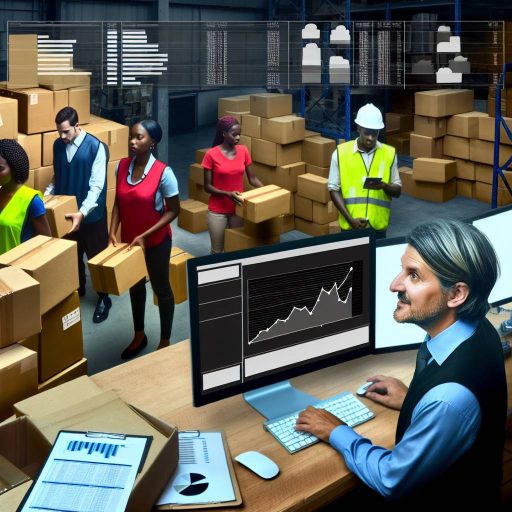Introduction:
Logistics technicians play a vital role in managing supply chains.
Staying updated on future trends is crucial for career growth.
Current Role of Logistics Technicians:
Logistics technicians are responsible for overseeing the movement of goods.
They collaborate with suppliers, carriers, and customers to ensure efficient operations.
Utilizing technology such as warehouse management systems to track inventory.
Analyzing data to optimize routes, reduce costs, and improve delivery times.
Importance of Future Trends:
Technology advancements like AI and IoT are reshaping the industry.
Adapting to new tools and software is essential for competitiveness.
Automation will streamline processes, requiring new skills from technicians.
Sustainability practices will become increasingly important in logistics operations.
Keeping pace with industry changes ensures job security and career advancement.
Future Directions for Logistics Technicians:
Staying informed and adaptable to future trends is key for logistics technicians.
Embracing innovation will not only benefit individuals but also drive industry progress.
Automation and Robotics in Logistics:
The growing role of automation and robotics in the logistics industry:
Automation and robotics have revolutionized the way logistics operations are carried out.
The use of autonomous vehicles, drones, and robots has increased efficiency, accuracy, and speed in the transportation and warehousing sector.
These technologies have enabled companies to streamline their processes, reduce costs, and improve customer satisfaction.
Implications for logistics technicians:
With the integration of automation and robotics in logistics, the role of logistics technicians is evolving.
Technicians will need to adapt to new job responsibilities and skill requirements to stay relevant in the industry.
Transform Your Career Today
Unlock a personalized career strategy that drives real results. Get tailored advice and a roadmap designed just for you.
Start Now- Understanding and operating automated systems: Logistics technicians will need to have a thorough understanding of how automated systems work and how to operate them efficiently.
- Maintenance and troubleshooting: As automation and robotics become more prevalent in logistics, technicians will be required to perform regular maintenance tasks and troubleshoot any technical issues that arise with these systems.
- Data analysis and interpretation: Logistics technicians will need to be proficient in analyzing data collected by automated systems and interpreting the results to make informed decisions.
- Collaboration with technology teams: Technicians will need to collaborate closely with technology teams to ensure that automated systems are operating effectively and meeting the needs of the business.
- Continuous learning and upskilling: To stay competitive in the industry, logistics technicians will need to engage in continuous learning and upskilling to keep pace with technological advancements in automation and robotics.
Overall, the integration of automation and robotics in logistics presents both challenges and opportunities for logistics technicians.
By embracing these technological advancements and acquiring new skills, technicians can enhance their expertise and contribute effectively to the success of logistics operations.
Artificial Intelligence and Machine Learning
Artificial Intelligence (AI) and Machine Learning (ML) are two cutting-edge technologies that are transforming the logistics industry.
These technologies are not only streamlining operations but also improving efficiency and accuracy in various facets of logistics management.
Exploring the Impact of AI and ML in Logistics Operations
- AI and ML algorithms have the capability to analyze vast amounts of data at lightning speed, enabling logistics companies to make informed decisions in real-time.
- These technologies help predict demand patterns, optimize routes, and manage inventory levels efficiently, leading to cost savings and improved customer satisfaction.
- AI-powered chatbots can provide instant customer service, track shipments, and resolve queries, reducing the burden on logistics technicians.
Opportunities for Logistics Technicians
- Logistics technicians can leverage AI and ML tools to automate routine tasks like inventory tracking, order management, and scheduling.
- By utilizing predictive analytics, technicians can anticipate maintenance needs, ensuring that equipment is serviced proactively to avoid downtime.
- AI-powered systems can help optimize warehouse layouts, improving storage efficiency and reducing fulfillment times.
AI and ML technologies are revolutionizing the way logistics operations are managed.
Logistics technicians have a unique opportunity to embrace these advancements to enhance efficiency and accuracy in their roles, ultimately driving the industry towards a more streamlined and cost-effective future.
Delve into the Subject: Best Distribution Management Software in 2025
Big Data and Analytics
Big data and analytics are playing an increasingly important role in revolutionizing the logistics industry.
The impact of big data and analytics on logistics decision-making processes cannot be overstated.
- Improved Decision-Making: Big data provides logistics professionals with valuable insights to make informed decisions quickly.
- Enhanced Efficiency: Analytics tools can optimize routes, reduce delays, and minimize costs in the supply chain.
- Real-Time Monitoring: Data analytics allow for real-time monitoring of inventory levels, transportation routes, and customer demands.
Skills for Logistics Technicians
As big data and analytics become more prevalent in the logistics industry, logistics technicians need to develop specific skills to effectively analyze and interpret data.
- Statistical Analysis: Understanding statistical methods is essential for interpreting large amounts of data accurately.
- Data Visualization: Proficiency in data visualization tools helps technicians present information in a clear and concise manner.
- Data Mining: Knowledge of data mining techniques is crucial for identifying patterns and trends within the data.
- Machine Learning: Familiarity with machine learning algorithms enables technicians to predict outcomes based on historical data.
Mastering big data and analytics is essential for logistics technicians to stay competitive in the rapidly evolving industry.
Honing these skills can contribute to more efficient and effective decision-making processes in logistics operations.
Embracing the power of data-driven insights will be key to success for future logistics technicians as they navigate the complexities of the supply chain.
Gain More Insights: Warehouse Supervisor: Ensuring Accurate Order Fulfillment
Internet of Things (IoT) in Logistics:
The integration of IoT devices in logistics operations allows for real-time tracking and monitoring of shipments.
Logistics technicians can utilize IoT technology to improve supply chain visibility by having access to accurate and up-to-date information at all times.
Benefits of IoT in Logistics:
- Enhanced visibility: IoT devices provide real-time data on the location and condition of goods throughout the entire supply chain.
- Efficiency: With IoT technology, logistics technicians can streamline processes, reduce errors, and optimize route planning.
- Cost savings: By improving operational efficiency and reducing delays, IoT can help lower overall logistics costs.
- Customer satisfaction: Real-time tracking and monitoring allow for better communication with customers and enhanced delivery accuracy.
Examples of IoT Devices in Logistics:
- GPS trackers: These devices provide real-time location information for shipments, enabling logistics technicians to track their movements.
- Temperature sensors: IoT sensors can monitor the temperature of perishable goods during transit to ensure they remain within the optimal range.
- RFID tags: Radio-frequency identification tags help track inventory levels, prevent loss, and improve overall supply chain management.
- Smart sensors: These sensors can detect shocks, vibrations, or other environmental factors that may impact the quality of goods in transit.
The integration of IoT devices in logistics operations offers numerous benefits for logistics technicians, including improved supply chain visibility, enhanced efficiency, cost savings, and better customer satisfaction.
See Related Content: Day in the Life of an Aviation Maintenance Technician
Sustainability and Green Logistics:
As the world becomes more environmentally conscious, sustainability plays a vital role in logistics operations.
Here are some key points to consider:
Transform Your Career Today
Unlock a personalized career strategy that drives real results. Get tailored advice and a roadmap designed just for you.
Start Now- Addressing the growing importance of sustainability in logistics operations.
Logistics technicians have a significant role in reducing the carbon footprint and promoting eco-friendly practices.
Here are some ways they can contribute:
- Optimizing transportation routes to minimize fuel consumption.
- Utilizing electric vehicles and alternative fuel sources.
- Implementing paperless systems to reduce waste.
- Collaborating with suppliers who prioritize sustainability.
- Reducing packaging materials through innovative solutions.
- Investing in energy-efficient warehouse operations.
- Embracing recycling and waste management practices.
See Related Content: Safety Protocols for Aviation Maintenance Technicians

Supply Chain Digitization:
The trend towards digitalization of supply chain processes is rapidly growing.
Companies are embracing technology to streamline their operations and improve efficiency.
Skills that logistics technicians should acquire to adapt to the digitized supply chain environment:
- Understanding of Data Analytics:
- Knowledge of Inventory Management Software:
- Proficiency in Supply Chain Management Systems:
- Ability to Use Transportation Management Software:
- Familiarity with Internet of Things (IoT) Devices:
- Adaptability to Emerging Technologies:
- Communication and Collaboration Skills:
- Critical Thinking and Problem-Solving Abilities:
- Continuous Learning and Adaptation:
Collaboration and Integration in Logistics:
Collaboration is essential for the seamless functioning of the logistics ecosystem.
It involves various stakeholders such as manufacturers, suppliers, distributors, retailers, and transportation providers working together towards a common goal.
Here are some key points that highlight the importance of collaboration in logistics:
- Efficient Use of Resources: Collaboration allows for the optimal use of resources by eliminating redundancies and reducing costs.
- Improved Communication: Effective communication is crucial for the smooth flow of goods and information across the supply chain. Collaboration helps in enhancing communication channels among different parties.
- Enhanced Customer Service: By working together, stakeholders can provide better service to customers by ensuring timely delivery and addressing any issues promptly.
Logistics technicians play a vital role in facilitating collaboration and integration within the logistics ecosystem:
- Technology Adoption: Technicians can leverage technology to streamline processes and enhance communication among stakeholders.
- Process Optimization: By identifying inefficiencies and bottlenecks in the supply chain, technicians can suggest improvements to enhance collaboration.
- Training and Development: Technicians can conduct training sessions for different stakeholders to enhance their understanding of the supply chain processes and foster collaboration.
Collaboration and integration are crucial for the success of the logistics industry.
By working together and leveraging the expertise of logistics technicians, stakeholders can achieve greater efficiency, cost savings, and improved customer satisfaction.
Future Trends for Logistics Technicians
As the field of logistics continues to evolve rapidly, it is essential for logistics technicians to stay informed and adapt to the key future trends to remain competitive and relevant in the industry.
Technologies such as AI, IoT, and blockchain are reshaping the way logistics operations are conducted.
Technicians must be proactive in acquiring new skills and knowledge to leverage these advancements.
By embracing automation, digitalization, and data analytics, logistics technicians can streamline processes, improve efficiency, and enhance customer satisfaction.
Continuous learning and upskilling will be crucial for technicians to thrive in the evolving industry landscape.
By staying abreast of the latest trends and innovations, logistics technicians can position themselves as valuable assets in the supply chain ecosystem.




